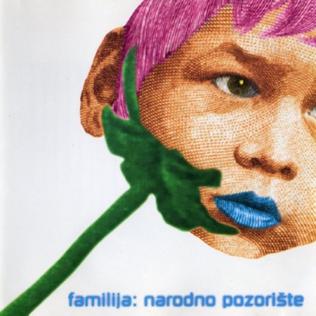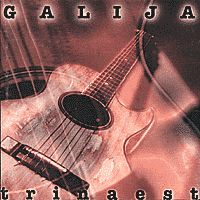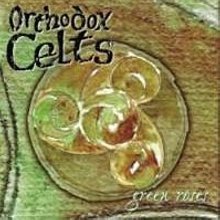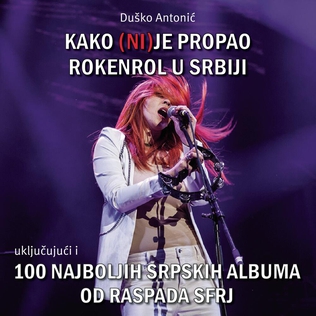
Orthodox Celts is a Serbian band formed in Belgrade in 1992 which plays Irish folk music combined with rock elements. Despite their uncharacteristic genre in their home country, the band is one of the top acts of the Serbian rock scene and has influenced several younger Serbian bands, most notably Irish Stew of Sindidun and Tir na n'Og.
Srđan "Žika" Todorović is a Serbian actor and musician. Todorović has served as a member of numerous bands, including Ekatarina Velika, Disciplina Kičme, Radnička Kontrola and Bezobrazno Zeleno.

Galija is a Serbian and former Yugoslav rock band formed in Niš in 1976.

Disciplina Kičme, currently working under the slightly altered name of Disciplin A Kitschme, is a Serbian band, one of the two spin-offs of the seminal Yugoslav new wave and later post-punk band Šarlo Akrobata, the other being Ekatarina Velika. Musically, they are best described as an aggressive and artistic rhythmic explosion, experimenting and seeking out new expressiveness while finding inspiration in the traditions of punk rock, funk, jazz fusion, motown, jungle, drum and bass, and the works of Jimi Hendrix.

Nenad Milosavljević, also known as Neša Galija, is a Serbian musician and politician, best known as the frontman of the Serbian and former Yugoslav rock band Galija. He is the brother of Galija vocalist and lyricist Predrag Milosavljević. Nenad Milosavljević is a member of Socialist Party of Serbia, and is a former deputy in the National Assembly of Serbia.

Buvlja pijaca is the fourth studio album from Serbian and former Yugoslav rock band Riblja Čorba, released in 1982.

Vladimir "Vlada" Divljan, was a Serbian singer and songwriter. He was known as the frontman for the Serbian and Yugoslav rock band Idoli, one of the bands which initiated the Yugoslav new wave on the music and cultural scene of Yugoslavia in the 1980s, as well as for his solo works.

Familija was a Serbian rock supergroup from Belgrade, consisting of Vampiri, Košava and U Škripcu members. The band's musical style was a combination of ska, pop, ethnic and rock music.

Narodno pozorište is the debut album of the Serbian rock supergroup Familija, released in 1995.

Druga plovidba is the second studio album from Serbian and former Yugoslav rock band Galija.

Istorija, ti i ja is the eighth studio album from Serbian and former Yugoslav rock band Galija. It is the third and the final part of the trilogy consisting of the album Daleko je Sunce, the album Korak do slobode and this album. It is the third album recorded in cooperation with lyricist Radoman Kanjevac.

Trinaest is the tenth studio album from Serbian and former Yugoslav rock band Galija.

Voleti voleti is the eleventh studio album from Serbian and former Yugoslav rock band Galija.

Oženiše me muzikom is a 3-piece compilation album from the Serbian rock band Galija, released in 2009. With the release of the album the band marked thirty years from the release of their debut album Prva plovidba. Oženiše me muzikom features two discs with a choice of Galija songs recorded during 1979-1996 period, and a DVD entitled Kamera kao svedok, with a choice of Galija music videos.

Green Roses is the third studio album by the Serbian Irish folk/Celtic rock band Orthodox Celts released in 1999.

A Moment Like the Longest Day is the fourth studio album by the Serbian Irish folk/Celtic rock band Orthodox Celts released in 2002.

YU 100: najbolji albumi jugoslovenske rok i pop muzike is a book by Duško Antonić and Danilo Štrbac, published in 1998. It features a list of top 100 former Yugoslav popular music albums, formed according to the poll of 70 Serbian music critics, journalists, artists and others.

How Rock'n'Roll was Ruined is a 1989 Serbian omnibus comedy film. It comprises three story segments, written and directed by three different screenwriters and directors. The score was also a joint effort, with lead musicians from rock bands Idoli, Električni Orgazam, and Disciplina Kičme each composing the music for one segment. The three independent stories are situated within the context of popular and youth culture in Yugoslavia at the time just before the country broke up, and abound with satirical, farcical, and absurdist humour. The film was awarded a Golden Arena for Best Film Editing at the Pula Film Festival in 1989. It attained cult status in the following years.
100 najboljih pesama svih vremena YU rocka was a list compiled by the Serbian music magazine Rock Express. In 1999, Rock Express started the poll for the selection of top 100 Yugoslav rock songs. The whole list was published in the 25th issue of Rock Express, in 2000. The list contains rock music songs from Socialist Federal Republic of Yugoslavia and the songs from successor states.

Kako (ni)je propao rokenrol u Srbiji is a book by Duško Antonić, published in 2021. The book features a number of Antonić's essays on Serbian rock scene, as well as a list of 100 best Serbian rock music albums published after the dissolution of SFR Yugoslavia. The list was formed according to the poll of 58 Serbian music journalists and critics, artists and others, similarly to the poll in the 1998 book YU 100: najbolji albumi jugoslovenske rok i pop muzike by Antonić and Danilo Štrbac.














